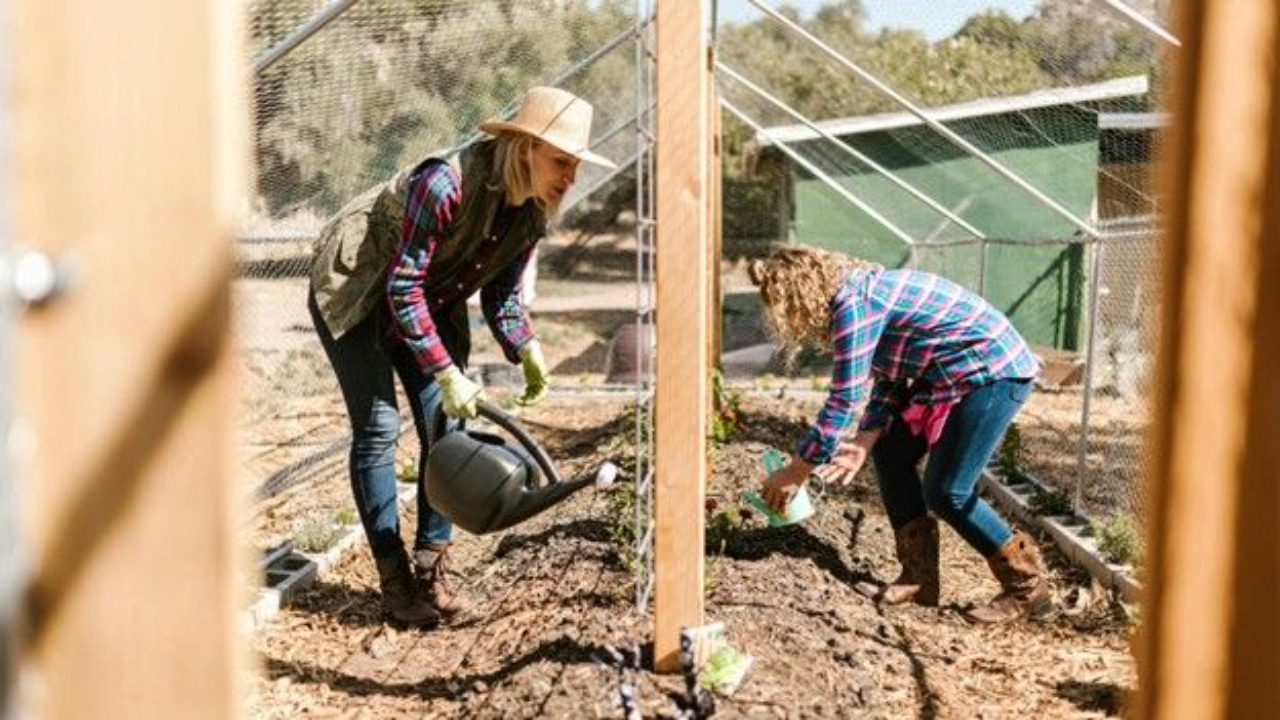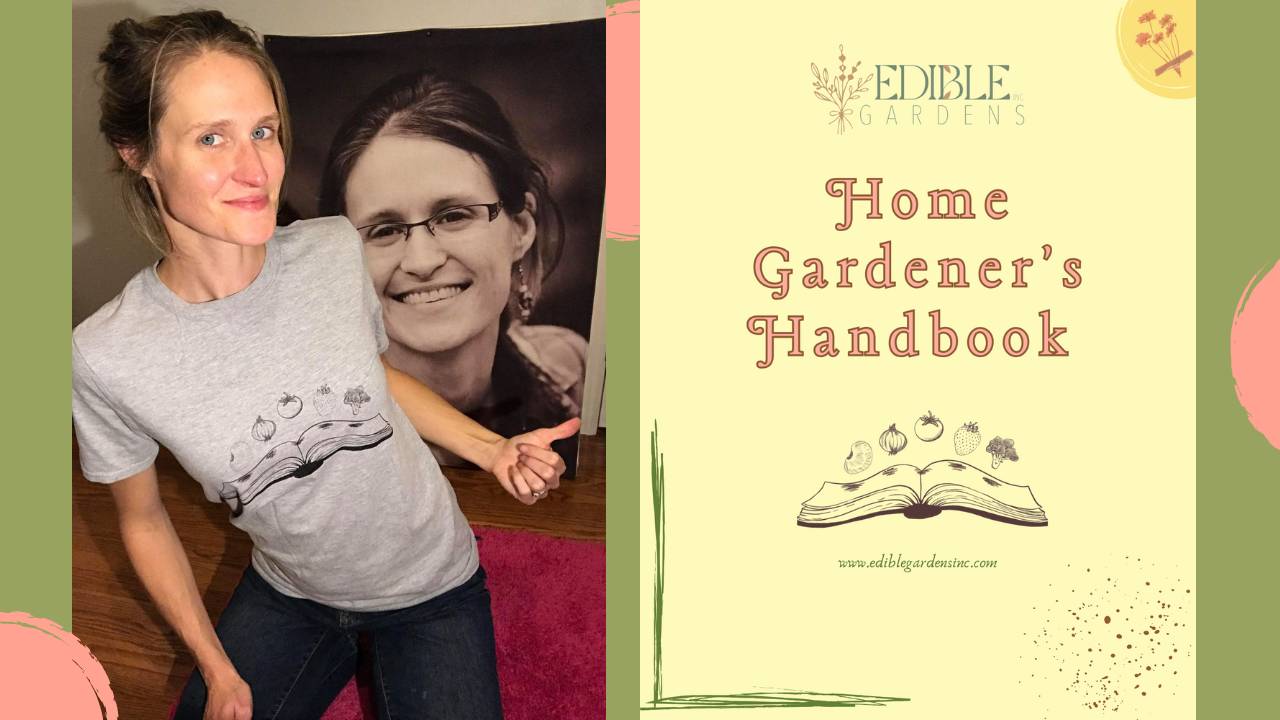How Much Water Do Vegetable Gardens Need?
We are so grateful to have gotten some measurable rainfall in Louisville, KY this week! There truly is no substitute for good old fashion rain in the home garden.
It’s been a HOT summer with temperatures in the 90's and heat indexes in the 100's. Thank goodness for irrigation systems, city water, and of course RAIN water.
Fruits, vegetables, and herbs are heavy drinkers, ha, and need consistent watering. If not, they can develop a myriad of problems.
Inconsistent watering in a food garden can lead to: Blossom End Rot on tomatoes and peppers; plants drying out and burning up entirely; stunted growth and development; and unworkable soil - to name a few.
Here is a good metrics on water requirements for edible plants:
Most food crops need one inch of water per week in 60 degree Fahrenheit weather.
For every 10 degree rise in temperature your plants will need an additional 1/2” of water.
In the 70’s you’ll need 1 1/2” of water.
In the 80’s they need 2” of water.
In the 90’s th...
From Soil to Sustainability

Image via Pexels
From Soil to Sustainability: A Practical Guide to Starting and Monetizing a Small Farm
If you’ve been craving a life tethered to the land, where your hands work in rhythm with the seasons and your profits grow from the earth, launching a small farm might be your calling. But make no mistake—farming is a business just as much as it is a lifestyle. That means you’ll need to make smart decisions from the very beginning to create something that can thrive both agriculturally and financially. Whether you dream of lush rows of vegetables, pasture-raised animals, or something more unconventional like agritourism or alternative energy partnerships, there’s a path forward. What matters is planning with intention and acting with clarity.
Choosing the Right Land
Before you buy a single seed or tractor, you’ll need to secure land that actually supports your farming goals. Soil quality is critical, and so is water access—two things that aren’t always obvious in a real estate li...
Fires are Burning - Farm & Garden Health

Reflecting upon your personal journey is so important. In the moment we don't always know if we are making the right decision.
Twenty years ago I walked away from a life of booze and smoke.
Eighteen years ago personal health problems led me to local food and farms.
I learned how badly damaged our modern food and farm systems are. One that has chosen monoculture over biodiversity. One that has adopted chemical fertilizers and pesticides over good soil management.
Government subsidies for "field crops" like soy, corn, and wheat have burdened our bodies, our land, and our economies.
Sixteen years ago I walked away from corporate America to pursue local farm work.
Local systems use sustainable, ethical practices. They value good stewardship and honor natural ecosystems.
Fourteen years ago i opened a farm business to nurture my soul and serve my higher power.
Sometimes we make drastic changes that don't always lead to a clear place. Doors open and you just keep walking.
Nine years ago we star...
Health Benefits of Herbs in the Home Garden

3 REASONS TO GROW HERBS IN YOUR GARDEN
- Good for you! Using herbs daily in cooking as well as using them in other home remedies (teas, tinctures, etc.) promotes well rounded nutrition. There is an herb for nearly every ailment. Using herbs as preventive healthcare can decrease/eliminate future health complications and diseases.
- A lot of them are perennial and easy to grow! There is less succession planting (turn-over) then there is with most vegetable plants.
- The vast majority of them will keep bad bugs out of your garden, such as mosquitoes/ticks- a lot of them even attract beneficial pollinators! Most of them go undisturbed by hungry critters and insects.
Herb/Growing Key
P = Perennial (First year they sleep, second year they creep, third year they LEAP!)
A = Annual
B = Biannual
W = WIld Herb (grows naturally/wild in our region)
G = Garden Herb (will grow/thrive when planted/tended to in our region)
WHAT HERBS CAN I GROW?
“CULINARY HERBS”
Many herbs you h...
Deer Hunting Season in Kentucky

Deer hunting got my attention in 2013.
What It’s Like To Work With A Garden Consultant

There are thousands of people in the world who are interested in gardening but don’t have the knowledge or skills required to grow a successful garden. If you want to start your own garden, it's helpful to find someone in your community who is able to teach and guide you through the seasonal steps of vegetable gardening. This is where a garden consultant or professional gardener comes in.
Garden consulting is a service that empowers and educates families on how to plan, install, and maintain a healthy garden year round. Here is a short guide to help you understand who a garden consultant really is.
What is a Garden Consultant?
A Garden Consultant is a gardening mentor, designer, and problem solver. They provide a framework for beginning gardeners based on site selection, garden setup, and crops that grow locally. A garden consultant can also be a garden designer or landscaper, but what sets them apart is their expertise in food production. They are proficient in soil science and fe...
Benefits to Planting Cover Crop in Home Gardens

You always hear about farmers rotating crops to replenish soil nutrients. What you don't hear much about are other options that provide the same results. You guessed it, Cover Crops!
A cover crop is traditionally a non-edible grain, legume, or tillage radish sown to feed the microbes under the ground - in your garden beds.
Winter is THE busiest time of year for soil decomposition. Cover Crops help to feed the biological soil life keeping them active longer. In return, these plants will reduce soil erosion, improve aeration, improve drainage, replenish nitrogen, and organic matter.
In Kentucky, we like to use a Winter Blend containing: Winter rye, Austrian peas (or Hairy Vetch or Crimson Clover), and daikon radish. This will sprout in the Fall, go dormant in the Winter, then grow more in the Spring. It's gorgeous and green ALL WINTER. Come Springtime, cultivate plants into the soil and let them rest before planting in that bed. You may also plant among the cover crop remains. May tak...
Sustainable Income: Proven Methods to Monetize Your Hobby Farming Efforts

Sustainable Income: Proven Methods to Monetize Your Hobby Farming Efforts
Do you often find yourself dreaming about turning your hobby farm into a sustainable source of income? With a bit of creativity and strategic thinking, you can transform your passion for farming into a profitable venture. There are numerous opportunities for homesteaders to generate revenue while enjoying the rural lifestyle they love. Let's delve into the innovative ways you can monetize your hobby farm and cultivate a thriving business, courtesy of Edible Gardens Inc.
Building Up Your Business Acumen
If you’re looking to distinguish yourself from your competition in the business world, a great way to accomplish this is by going back to school and increasing expertise from business degrees available through online courses. That way, you can advance your understanding of the business world by working at your own pace from the comfort of home, then incorporating the lessons you learn in real time. This is perf...
Summerthyme Herb Workshop in Louisville, KY

|
|
|
|
Community Gardens for Food Security

Planting a Garden: A Step Towards Helping Vulnerable Neighbors, Soup Kitchens, and Food Pantries
Gardening is more than just a hobby; it's a powerful tool for community support and social change. This Edible Gardens Inc. article explores how planting a garden can be transformed into a meaningful endeavor to help vulnerable neighbors, soup kitchens, and food pantries. By harnessing the power of gardening, we can contribute to alleviating food insecurity in our communities.
Starting a Community Garden
A community garden is a fantastic way to begin your journey in helping others through gardening.
- Identify a Suitable Location: Look for unused land in your neighborhood that can be converted into a garden.
- Engage the Community: Involve local residents and groups to foster a sense of community ownership.
- Plan Your Garden: Decide on the types of vegetables and fruits that are most needed in your community.
Partnering with Local Organizations
Building partnerships with local soup k...


